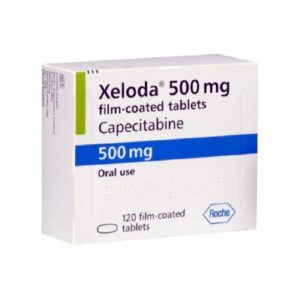CAPECITABINE
CAPECITABINE: CAPECITABINE is an oral chemotherapy drug that is commonly used to treat various types of cancer, including breast, colorectal, and gastric cancers. It is sold under the brand name Xeloda.
The mechanism of action of CAPECITABINE involves being converted into its active form, 5-fluorouracil (5-FU), in the body. 5-FU is an antimetabolite that interferes with the synthesis and function of DNA, ultimately leading to the inhibition of cancer cell growth and division.
The dose of CAPECITABINE varies depending on the type of cancer being treated and the patient’s individual circumstances. It is usually taken orally, twice a day, for two weeks followed by a one-week rest period. This cycle may be repeated for several months or as prescribed by the treating physician.
Like any medication, CAPECITABINE can cause side effects. Common side effects include hand-foot syndrome (redness, pain, peeling of the skin on the palms of the hands and soles of the feet), diarrhea, nausea, vomiting, loss of appetite, fatigue, and hair loss. Some patients may experience more severe side effects such as bone marrow suppression (leading to increased risk of infection or bleeding), liver toxicity, and gastrointestinal perforation, although these are less common.
It is important to note that CAPECITABINE can interact with other medications, so it is crucial to inform the healthcare provider of any other drugs being taken. Also, CAPECITABINE is contraindicated in patients with known hypersensitivity to 5-FU or any of the other components of the drug.
As always, patients should consult their healthcare provider for specific information about their condition and to discuss the potential risks and benefits of using CAPECITABINE.

